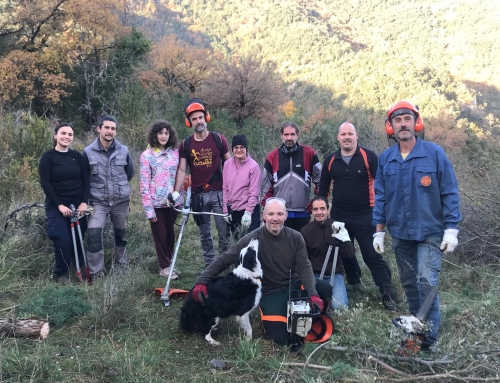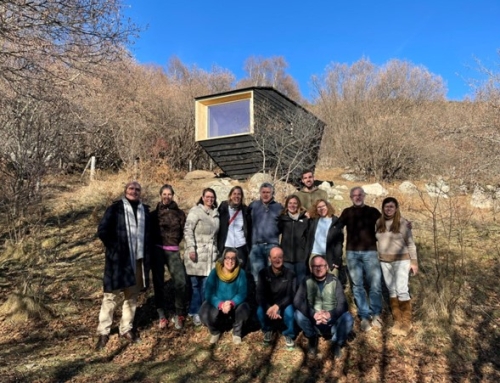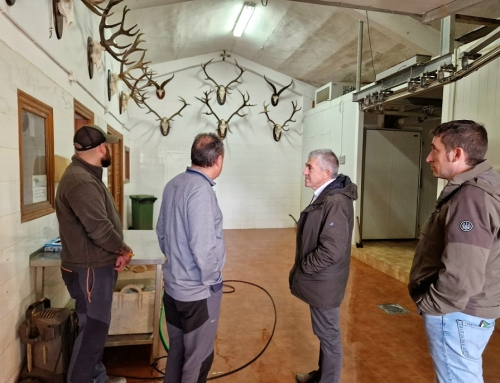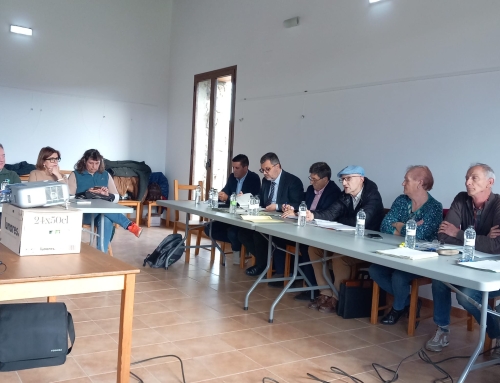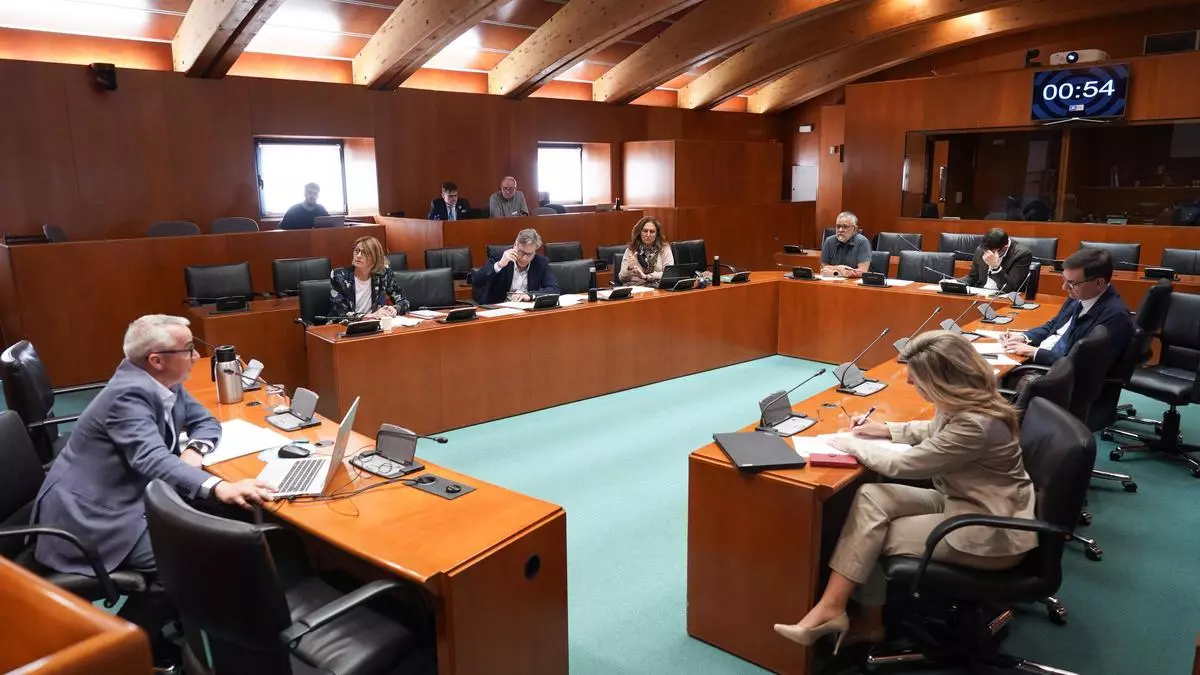
Quorum’ in the Cortes for the tax on renewables to be finalist.
Up to 15 actors of the green energy sector and naturalist and landscape defense entities have discussed this Monday in the Parliament as a previous step to the drafting of the project for the new regional tax. A few hours after the streets of Zaragoza
The Aragonese Parliament has witnessed a long session of hearings prior to the legislation of the regional tax on solar and wind energy plants. Up to 15 speakers followed each other around the committee room without anyone deviating much from what was expected. If the companies clamored against the tax because it will paralyze the investments underway and will generate legal uncertainty, the naturalist associations and in defense of the landscapes asked for more hardness to the Executive of Azcón to order the green expansion. There was only ‘quorum’ on one issue: the collection, when it becomes a reality, must have a “finalist” character to have a positive impact on the territory. The ball is now in the court of the Ministry of Finance, directed by Roberto Bermúdez de Castro, which must finalize a tax with which it intended to raise 30 million this year and more than 50 million in the following years, although everything points to the fact that it will be less. This has been well summarized by María Rosa Duarte Pac, professor of Fundamentals of Economic Analysis at the University of Valencia.
University of Zaragozawho has presented a study on the Campo de Belchite region, one of the largest wind farms during the early stages of renewable energy development. “In the period under analysis, we found that the (renewable) installations had not contributed to reversing the trend towards depopulation of the territory due to the sector’s low share of total activity or its capital-intensive nature or the impossibility of attracting other investments meant that it did not act as a motor demographic”, said Duarte, citing that there was “a limited impact on income and a transitory effect on the employment that was not sustained over time”. The study was extrapolated to other regions of Europe and, in short, the cases analyzed “say that in those territories where there was a population decline these technologies had not been able to reverse these trends“, suggesting that the associated social effects “cannot be achieved on their own”. “We believe that a tax policy can have an impact in the direction of mobilizing productive activities as long as it has a clear commitment to rural development,” the researcher concluded. Another researcher, in this case from Galicia, where the renewables conflict is more alive than ever, was against the tax. José Manuel Iglesias, professor of the Master’s Degree in Renewable Energy at the University of Santiago de Compostela, spoke about the “contradiction in themselves that they represent”, given that the visual impact is the only one they recognize but “they ignore the advantages of using a native and inexhaustible resource and improve the local economy”. “Extra taxation should not be used because an environmental tax, by definition, should tend to collect zero. Its objective should be that polluting entities emit as little as possible, and that is not consistent with encouraging renewables,” explained Iglesias, who expressed his doubts that the tax has capillarized over the territory in those autonomous regions where it is already applied. Ignacio Pérez-Soba, president of the Official College of Forestry Engineers of Aragón, sees “opportune” the decision to create a tax that has already been taken in other autonomous regions.
“It must have an extra-fiscal character to make investments in the natural environment. And it is essential that there is a finalist character. on the natural environment of these taxes, because up to now this has not been the case,” he summarized.
The territory wants the proceeds
This benefit on the territory was also claimed by the president of the Aragonese Federation of Municipalities, Counties and Provinces, Carmelo Pérez, and by the Viento Alto Association, whose president, Fernando Safón, called to produce “more benefits for the affected municipalities and that the tax has an impact on the Aragonese Solidarity Fund”. For their part, the various companies and associations that have appeared have criticized the legal uncertainty, the negative impact it will have on investors and have defended that renewables already have benefits on the territory. Daniel Fernández, Engie Spain’s director of public affairs and regulation, believes that there is room for improvement in the tax and “other less incisive mechanisms”, such as the commitment to hire local suppliers, local employment guarantees, etc. “We are not against the tax, but against this tax.
. Las renovables son buenas en sí mismas, no debemos señalarlas. Hay inconsistencias y asimetrías con respecto a autonomías como Andalucía o Extremadura”, criticized Fernández. For her part, Silvia Encinas, her counterpart at EDP, criticized the “erroneous idea” that renewables do not have an impact on the territory. “We already pay ICIO, IBI, corporate tax or the tax on the value of electricity production. We have seen how in municipalities where renewables are installed budgets are increasing by an average of 77%, and those funds should revert in local economies through recurring revenues, land rents, direct and indirect jobs or compensatory measures.” “The fee jeopardizes one of the main development vectors of Aragon: renewable energies. It will generate legal uncertainty that affects investors but also industrial consumers who have PPAs signed with developers,” summarized Juan Virgilio Márquez, president of the Asociación Empresarial Eólica. In fact, he is referring to those large companies that announce their transition to green energy with projects associated with the main electricity companies through their financing. They ask not to apply the tax to existing wind farms because it would be a regulatory malpractice and warn that it will affect the cost of electricity. “In Spain we have never had competitive advantages in an industrial revolution that will mean that we will have an electricity cost half that of Germany. We cannot diffuse it through taxes and a feeling of legal uncertainty, which will have repercussions on the cost overruns for consumers. It makes no sense to talk about a sun tax again if it is applied to industrial solar self-consumption, and the taxable base of the tax cannot be the area fenced but the area used”, explained José Donoso, president of the photovoltaic employers’ association UDEF. From the Bearded Vulture Foundation advocated the precautionary principle and, after warning that 700 birds are located dead per year in Aragon by impact or electrocution, have stated that the draft legislation “should be clearly reflected that it is a finalist tax and bonus those located in landscapes of low environmental quality”. On the part of the March 13 Platform, they pointed out that the tax “is not adequate, but rather it is preferable to limit the environmental damage of these industrial activities.
. “Ahora bien, sí nos parece adecuado que se paguen impuestos especiales by these activities that damage the environment,” they explained. For his part, Javier Oquendo, spokesman for the Paisajes de Teruel platform, also insisted that the objective of the law being drafted is to tax environmental damage. “We are glad that it is recognized in the law, given that it is sometimes denied. Renewables are definitely good, but what there are are locations that are not suitable without harmless. The first thing to do is to plan for renewables and only then will we be able to project the tax. It is not a linear question, but has to take into account environmental, economic and social criteria”, said Oquendo, who took the opportunity to demand the moratorium.
Source:

